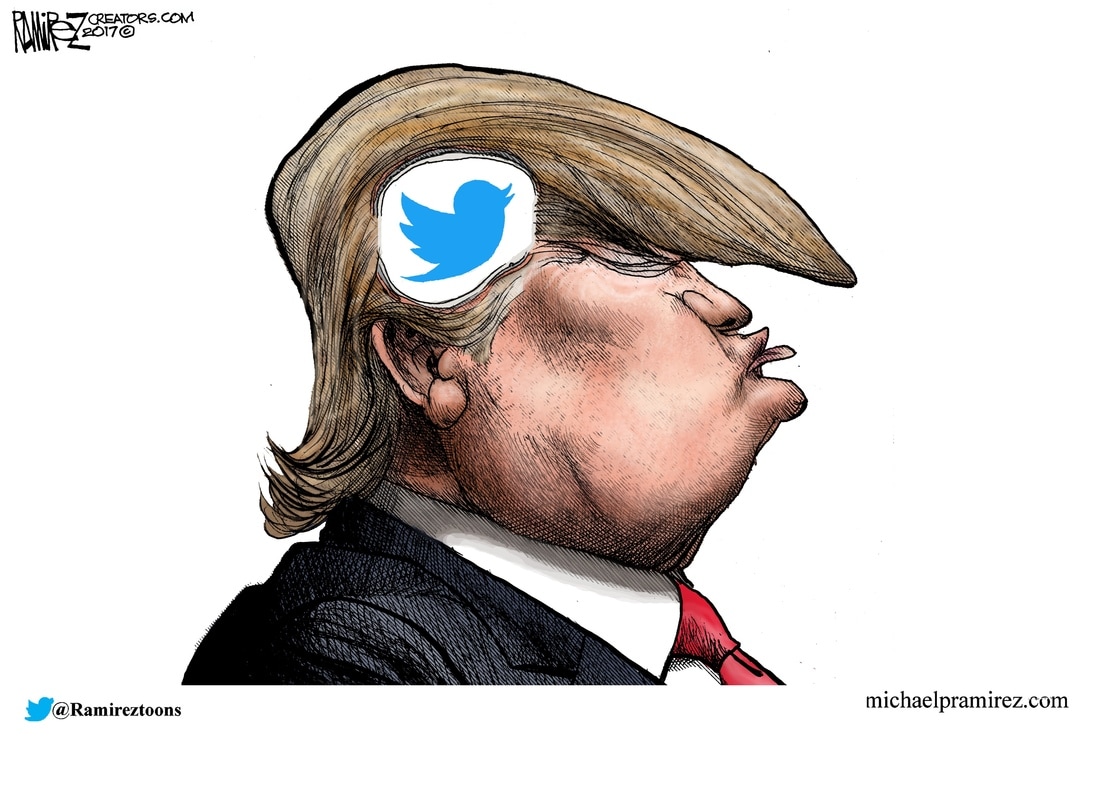Welcome to the World of Pulitzer Prize Winning Political Cartoonist Michael P. Ramirez
Birdbrain 06-12-17
Ill considered tweets spring to mind when evaluating Trump's style

Rules of Disorder
The president leads himself astray.
6:10 AM, JUN 12, 2017 | By FRED BARNES THE WEEKLY STANDARD
President Trump has three rules for operating in the world of government and politics. Time learned of them from a White House official and describes them this way: "When you're right, you fight. Controversy elevates message. And never apologize."
The rules sound like Trump and like no other president with the possible exception of Andrew Jackson, who's a Trump role model. They touch on Trump's character and are the underpinning of his combative, relentless style.
But the rules keep Trump in constant trouble. As often as not, they bring out the worst in him. It's not harmful to Trump or his administration when he infuriates Democrats, the left, or adversaries like Iran. It's when he alienates friends and allies that he and the country suffer.
Let's start with the rule on fighting when he's right. The problem is that Trump always believes he's right. And this leads to no-win clashes harmful to his credibility and presidency.
The London Bridge attack in May buttressed the president's case about the threat posed by "radical Islamic terrorists." But instead of focusing on that, he picked a fight with London mayor Sadiq Khan. He quoted Khan out of context and accused him of downgrading the terrorist threat.
It was reminiscent of the week he spent last summer attacking Khizr Khan, a Pakistani immigrant whose son, an Army captain, was killed in Iraq in 2004. He also insulted Khan's wife. Trump had been provoked by Khan's sharp criticism of him in a speech at the Democratic convention. This fight occurred during the campaign, but it was a preview of distractions to come. ~continued below~
The president leads himself astray.
6:10 AM, JUN 12, 2017 | By FRED BARNES THE WEEKLY STANDARD
President Trump has three rules for operating in the world of government and politics. Time learned of them from a White House official and describes them this way: "When you're right, you fight. Controversy elevates message. And never apologize."
The rules sound like Trump and like no other president with the possible exception of Andrew Jackson, who's a Trump role model. They touch on Trump's character and are the underpinning of his combative, relentless style.
But the rules keep Trump in constant trouble. As often as not, they bring out the worst in him. It's not harmful to Trump or his administration when he infuriates Democrats, the left, or adversaries like Iran. It's when he alienates friends and allies that he and the country suffer.
Let's start with the rule on fighting when he's right. The problem is that Trump always believes he's right. And this leads to no-win clashes harmful to his credibility and presidency.
The London Bridge attack in May buttressed the president's case about the threat posed by "radical Islamic terrorists." But instead of focusing on that, he picked a fight with London mayor Sadiq Khan. He quoted Khan out of context and accused him of downgrading the terrorist threat.
It was reminiscent of the week he spent last summer attacking Khizr Khan, a Pakistani immigrant whose son, an Army captain, was killed in Iraq in 2004. He also insulted Khan's wife. Trump had been provoked by Khan's sharp criticism of him in a speech at the Democratic convention. This fight occurred during the campaign, but it was a preview of distractions to come. ~continued below~
Trump fights in public with Republicans. He criticized Senators John McCain and Lindsey Graham for being "sadly weak on immigration" when they took exception to his temporary ban on immigration from seven Muslim countries. And weeks after praising Rep. Mark Meadows, the head of the Freedom Caucus in the House, he tweeted that Meadows and caucus members "will hurt the entire Republican agenda if they don't get on the team, and fast." Their offense was having opposed a health proposal favored by Trump.
Rather than court critics or Republicans who have crossed him, he blasts them. Since he believed he was right on health care, dissenters had to be reprimanded publicly. For Trump, politics is a zero-sum game. Either he wins or his detractors do.
There's some truth in Trump's rule that controversy elevates message. On immigration, he has feuded with Mexico, Hispanics, immigrants, Democrats, Hollywood, and anyone else who disagrees with him. This has elevated his message that illegal immigrants are a serious concern. They take jobs from American citizens. Many should be deported, starting with those with criminal records. Among Republicans and conservatives, Trump's position on immigration has prevailed and built support for rigorous border security.
Now, Trump has benefited from softening his position. He appears likely to give legal status to "dreamers," young people whose parents brought them here illegally. Mass roundups of illegal immigrants have been ruled out by Trump's Homeland Security secretary John Kelly. And Trump seems less draconian.
But many of the controversies created by Trump don't end well. They fail to elevate the message he may have in mind. A controversy ensued when he fired FBI director James Comey. What message did that raise up? It signaled that Trump is rash, impulsive, and self-absorbed.
The president raised a ruckus by downplaying the investigation of possible collusion between his campaign and Russia during last year's election. He has a point. So far as we know, no evidence of collusion has been uncovered. But Trump's interference has obscured this and made it look like he has something to hide.
Newt Gingrich says Trump never apologizes because he thinks it shows weakness. Sometimes it might. Yet it can also do the opposite: An apology by a confident leader can build loyalty, respect, and an expectation of being treated fairly.
Trump not only refuses to accept blame for screwups at the White House, he blames others. When he announced Comey's dismissal, his aides cited a Justice Department memo on Comey's actions in the case of Hillary Clinton's email. Two days later, he indicated to an interviewer that his irritation over the Russia investigation played a major part in the firing.
Though Trump had created the confusion, he didn't take responsibility. Rather, he suggested his aides were at fault for not keeping up with his fast-moving presidency. He seems unaware of this truism: Leaders take responsibility, losers blame others.
Leaders also don't belittle subordinates publicly. Yet last week, Trump subjected Attorney General Jeff Sessions to a public shaming. He complained the Justice Department had appealed the wrong immigration order to the Supreme Court. And he let it be known that by recusing himself from the Russia case, Sessions showed weakness.
There are more than a few apologies Trump might make without looking weak, beginning with Sessions. It wouldn't hurt if he apologized to the entire country of Mexico. A friendly nation to the south is beneficial. A country that hates the American president isn't.
It's important for Trump to give his Christian faith some breathing room at the White House. He'd soon realize that he's wrong on occasion, that controversies can be counterproductive, and that an apology or two would show strength and self-discipline.
Fred Barnes is an executive editor at The Weekly Standard.
Rather than court critics or Republicans who have crossed him, he blasts them. Since he believed he was right on health care, dissenters had to be reprimanded publicly. For Trump, politics is a zero-sum game. Either he wins or his detractors do.
There's some truth in Trump's rule that controversy elevates message. On immigration, he has feuded with Mexico, Hispanics, immigrants, Democrats, Hollywood, and anyone else who disagrees with him. This has elevated his message that illegal immigrants are a serious concern. They take jobs from American citizens. Many should be deported, starting with those with criminal records. Among Republicans and conservatives, Trump's position on immigration has prevailed and built support for rigorous border security.
Now, Trump has benefited from softening his position. He appears likely to give legal status to "dreamers," young people whose parents brought them here illegally. Mass roundups of illegal immigrants have been ruled out by Trump's Homeland Security secretary John Kelly. And Trump seems less draconian.
But many of the controversies created by Trump don't end well. They fail to elevate the message he may have in mind. A controversy ensued when he fired FBI director James Comey. What message did that raise up? It signaled that Trump is rash, impulsive, and self-absorbed.
The president raised a ruckus by downplaying the investigation of possible collusion between his campaign and Russia during last year's election. He has a point. So far as we know, no evidence of collusion has been uncovered. But Trump's interference has obscured this and made it look like he has something to hide.
Newt Gingrich says Trump never apologizes because he thinks it shows weakness. Sometimes it might. Yet it can also do the opposite: An apology by a confident leader can build loyalty, respect, and an expectation of being treated fairly.
Trump not only refuses to accept blame for screwups at the White House, he blames others. When he announced Comey's dismissal, his aides cited a Justice Department memo on Comey's actions in the case of Hillary Clinton's email. Two days later, he indicated to an interviewer that his irritation over the Russia investigation played a major part in the firing.
Though Trump had created the confusion, he didn't take responsibility. Rather, he suggested his aides were at fault for not keeping up with his fast-moving presidency. He seems unaware of this truism: Leaders take responsibility, losers blame others.
Leaders also don't belittle subordinates publicly. Yet last week, Trump subjected Attorney General Jeff Sessions to a public shaming. He complained the Justice Department had appealed the wrong immigration order to the Supreme Court. And he let it be known that by recusing himself from the Russia case, Sessions showed weakness.
There are more than a few apologies Trump might make without looking weak, beginning with Sessions. It wouldn't hurt if he apologized to the entire country of Mexico. A friendly nation to the south is beneficial. A country that hates the American president isn't.
It's important for Trump to give his Christian faith some breathing room at the White House. He'd soon realize that he's wrong on occasion, that controversies can be counterproductive, and that an apology or two would show strength and self-discipline.
Fred Barnes is an executive editor at The Weekly Standard.

